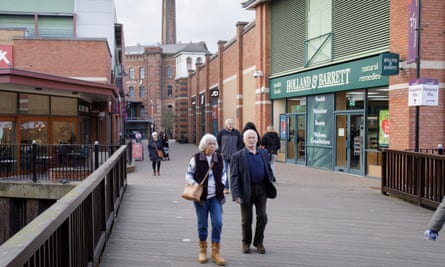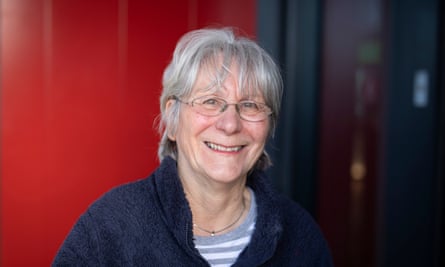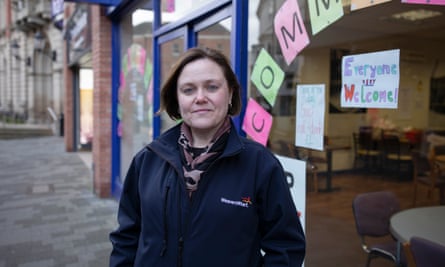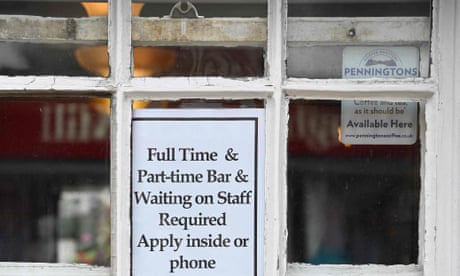Retirement boom among UK’s older workers creates economic headache
Wyre Forest in the West Midlands has seen a huge jump in the ‘economically inactive’, many of them affluent older people, but the dearth of workers is a real problem for employers

“Ialways laughed at people who said they’d never been so busy since they retired,” says David Richards, mopping his brow as he takes a break from the fast-paced game at Wyre Forest Leisure Centre near Kidderminster.
At 58, the retired GP from nearby Bewdley is among the younger players in this midweek morning game of pickleball – a cross between tennis and badminton that is growing rapidly in popularity across Britain.
Players in this packed session for older people range from 55 to more than 80, reflecting a nationwide surge in early retirement since the pandemic.
For Richards – and many others like him – the tumult of the past few years led him to reconsider his priorities. “The workload and stress levels just went through the roof in general practice. I struggled.”
He now fills his time with pickleball, badminton, yoga, tai chi and rambling. “I was fortunate to be able to take early retirement, and I thought I’d better start looking after myself – lose a bit of weight, get my blood pressure down.”
Since Covid struck, the number of 16- to 64-year-olds officially economically inactive – neither working nor job-hunting – has shot up. Driven in large part by retirement, it is a trend that is ringing alarm bells in government amid concerns over worker shortages and looming recession.
For many, the inactivity is involuntary. Millions have left the workforce because of long-term health conditions or caring responsibilities – developments made worse by an underfunded care system and crumbling health service.

Others stay out of the workforce from personal choice: many students are delaying the start of their working lives and the number of retired people has boomed to more than 1.1 million.
Here in Wyre Forest – the local authority district encompassing Kidderminster and towns and villages along the banks of the Severn – the figures are particularly stark. The number of people inactive due to retirement has quadrupled in three years to 5,200 – almost a tenth of the local working-age population. Compared with the national average of about 3%, it is up there with retirement hotspots such as the Yorkshire Dales and Devon.
Barry Walmsley chairs the local University of the Third Age (U3A) group, which puts on the weekly pickleball game and a plethora of other activities for those no longer in work. He says membership has ballooned to 800. “You’ve got a slightly younger demographic that hasn’t gone back to work after Covid and are looking for things to do. We’re gaining members rapidly.”
The feeling among the pickleball group – led by Michael de Groot, a semi-retired 63-year-old Dutchman, who introduced the game to the area – is that many have managed to retire thanks to building up decent pensions and paying off their mortgage. The average house price in this pocket of the Midlands is on the low side, at about £200,000, and this age group may have benefited from generous retirement plans long since watered down for younger workers.

“We’re all baby boomers,” says Sue Corbett, who retired from teaching at in nearby Stourport at 61, and is now in her 70s. “We paid into a good pension scheme, and I could draw it from 60. I feel grim for younger generations. I’ve got two boys in the same position. My kids aren’t going to get their pensions until they’re 68. They’ll be paying their mortgages off. They’re just in normal jobs – not high-flying jobs – paying their way with kids.”
Not that boomers are all bad for the economy. For many, their contribution is as part of an economically hidden army of childcare providers for their grandchildren, and as volunteers in the local community.
It is not hard to see why Wyre Forest is a popular retirement destination. Birmingham is in striking distance for culture, restaurants and shops, and there are country walks, pubs, and picturesque towns and villages.
Ian Miller, chief executive of Wyre Forest district council, says that for many people in the Black Country and Birmingham, Stourport, where caravan parks, a funfair and chip shops line the banks of the Severn, is the closest thing they have to seaside.
“A lot of people will have come to the area as kids and then chosen to retire here. Property prices are low in the scheme of things, and there are some low-cost options with the caravan parks.”
Yet this is not a place full of affluent silver shirkers. Kidderminster has seen its fair share of economic and social problems since the decline of its carpet industry. More than 20,000 people once worked in the factories that still dominate the town’s streetscape; they now employ barely a handful.

Jackie Roberts, who manages the Weavers Wharf shopping centre, has opened a “warm hub” in a former Shoe Zone store in town, selling baked potatoes and a hot drink for £1, squash for 10p, and slices of cake for 20p to support those struggling to make ends meet.
“It’s a town of two halves. We go from the uber-rich, international pop star status [Robert Plant, the Led Zeppelin frontman, lives nearby], to the bottom 5% of deprivation for the country.”
With soaring energy bills and inflation above 10%, early retirement is not possible for everyone. Official figures are showing a reversal of the recent increase, indicating that some people are being drawn back to work.
The government is keeping a close eye on the trend. With employers struggling to recruit enough workers nationwide, Mel Stride, the work and pensions secretary, has launched an urgent review of workforce challenges. The idea is to come up with policies to encourage those who have left the jobs market since Covid to return.
Britain is the only country in the developed world with employment still below pre-Covid levels at the start of this year, and these shortages were among headwinds highlighted by the International Monetary Fund in its stark downgrade for UK growth last week.
A government spokesperson said older workers were a “huge asset” to the British economy, and that supporting people to start or return to work was one of its “biggest challenges”. “This is why we continue to look into workforce participation and drive down economic inactivity at pace.”
Between the last two censuses, in 2011 and 2021, the median age in Wyre Forest has increased by three years to 47 – higher than the national average. Without a university campus, and fewer job opportunities than in the past, younger people have left the area, leaving companies struggling to recruit.

Richard Manser is among local business owners finding it tough. The managing director of Five Star Windows, he employs about 100 and is struggling to find people to sell and fit windows, doors and conservatories.
It is holding back growth after a boom in lockdown as people turned to home renovations, and with growing interest in energy efficiency during the cost of living crisis. Like many employers, Manser is concerned about a lack of younger workers coming through to replace older staff as they hit retirement.
“It’s more of a laidback retirement area here,” he says. “Obviously there are businesses doing well, like us. And it’s good for us that people are choosing to retire here – they’re a good demographic [to sell to] for us. But it’s also a struggle to find the right people to represent your company and go out and do it.”


No comments:
Post a Comment